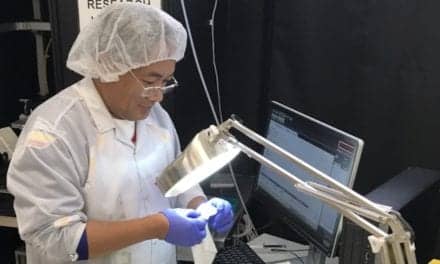Myriad Genetics Inc, Salt Lake City, has recently presented results from two studies highlighting the performance of its prenatal tests.1,2 The studies revealed that the Foresight carrier screen identifies 45% more couples at risk for having a child with cystic fibrosis than current guideline-based testing; and that the Prequel prenatal screen provides reliable results for up to 99.9% of patients, spanning the entire spectrum of fetal-fraction levels.
The Foresight carrier screen is designed to maximize detection of at-risk couples for serious, prevalent, and clinically actionable conditions. The test detects more than 175 conditions that provide meaningful information to patients. Additionally, Foresight offers superior technology with unmatched detection rates for the vast majority of genes on the panel (>99% across ethnicities), which means that patients can trust both positive and negative results.
The Prequel noninvasive prenatal screening test uses cell-free DNA to determine whether a pregnancy is at increased risk for chromosome abnormalities, such as Down syndrome. Prequel has been shown to be superior to screening methods that use maternal age, ultrasound, and serum screening. Additionally, Prequel has a lower false-positive rate and false-negative rate than the other methods. The Prequel prenatal screen can be ordered with the Foresight carrier screen, and is offered to all women, including those with a high body mass index, ovum donor, or a twin pregnancy.
“Our studies demonstrate the outstanding clinical performance of our tests in a general population of patients undergoing carrier and prenatal screening,” says James Goldberg, MD, chief medical officer at Myriad Women’s Health. “We believe these data will help inform medical guideline updates, support decisionmaking, and lead to better outcomes for couples.”
The Foresight study evaluated the performance of sequencing-based cystic fibrosis screening using the Foresight carrier screen compared to genotyping.1 Three carrier screening strategies were evaluated:
- Genotyping 23 guideline-recommended genetic variants (CF23).
- Sequencing all coding bases in the CFTR gene using Foresight (NGS).
- Sequencing plus large copy-number variant identification, also using Foresight (NGS+CNV).
Among the 13,080 couples screened, 58 couples were determined to be at risk for a pregnancy affected by cystic fibrosis; 40 were detected by CF23-only screening, 17 additional couples by NGS, and one additional couple by NGS+CNV. Importantly, these findings demonstrate that using Foresight would increase the detection of at-risk couples by 45% relative to current guideline-based testing. Of the couples identified as being at risk for cystic fibrosis, 89% said they planned or pursued actions to reduce the risk of having a pregnancy affected by cystic fibrosis, which underscores the clinical utility of the Foresight carrier screen to provide actionable information to prospective parents.
“Current medical guidelines for cystic fibrosis recommend carrier screening via targeted genotyping of 23 frequent variants; but that approach may miss many couples at risk,” adds Goldberg. “Our findings suggest the cystic fibrosis guidelines should be updated to allow for modern next-generation sequencing and variant interpretation that will enable more effective screening and better detection of at-risk couples.”
The Prequel study retrospectively analyzed data from 58,105 women screened with the prenatal screen, which uses a whole-genome sequencing approach to noninvasive prenatal screening (NIPS).2 Importantly, while Prequel measures fetal fraction, samples are not routinely failed due to fetal fraction being below a predetermined threshold. The results demonstrate that Prequel provided a test result for 99.9% of patients, meaning that only one in 1,000 received no result.
In the study cohort, a total of 572 cases tested positive for an aneuploidy or suspected aneuploidy. The clinical sensitivity and specificity levels were comparable to those observed for NIPS offerings with much higher failure rates. Critically, the study showed that test performance would not be improved with the use of a fetal-fraction threshold. Rather, applying such a threshold to Prequel would serve only to cause thousands of women to receive a test failure, and would unnecessarily delay the identification of a number of affected pregnancies.
“What these data demonstrate is the high accuracy of the Prequel test below a fetal fraction of 4%, meaning more patients receive reliable results the first time,” says Goldberg. “We believe the ability of the Prequel test to perform at any fetal-fraction level is unprecedented, and makes it the most effective noninvasive prenatal screening test for aneuploidy available to clinicians today.”
For further information, visit Myriad Genetics.
References
- Beauchamp K, Taber KJ, Grauman P, Spurka L, Lim-Harashima J, Muzzey D. Sequencing as a first-line methodology for cystic fibrosis carrier screening [abstract 880, online]. Poster presented at the annual meeting of the American College of Medical Genetics and Genomics, Seattle, April 2–6, 2019. Available at: https://acmg.expoplanner.com/index.cfm?do=expomap.sess&event_id=13&session_id=8700. Accessed May 10, 2019.
- Hancock S, Ben-Shachar R, Adusei C, Haverty C, Muzzey D. Avoiding unnecessary trade-offs: clinical experience for a noninvasive prenatal screen with both low no-call rate and high accuracy [abstract 911, online]. Poster presented at the annual meeting of the American College of Medical Genetics and Genomics, Seattle, April 2–6, 2019. Available at: https://acmg.expoplanner.com/index.cfm?do=expomap.sess&event_id=13&session_id=8660. Accessed May 10, 2019.
Featured image: Photo © Milkos courtesy Dreamstime (ID 110309178).





